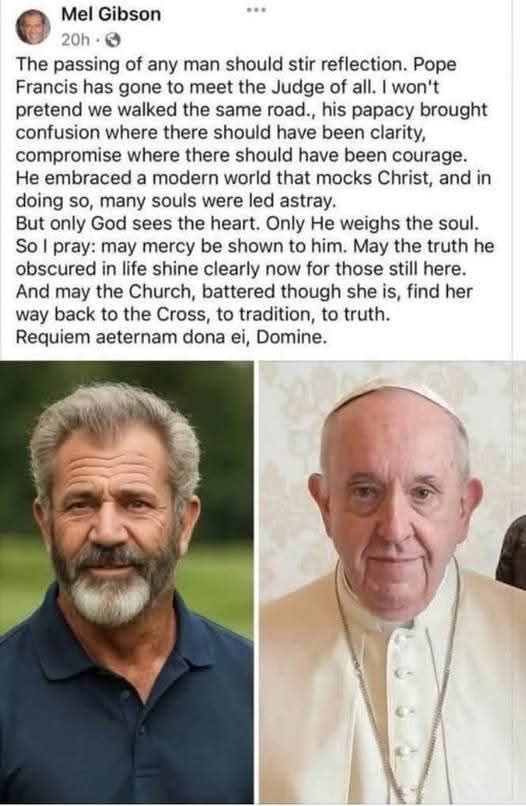By way of Ann Coulter, this showed up in my feed. It’s very well said, well enough that I had no choice but to share it.
I’m not Catholic but frankly I had my own problems with Francis, which I had mentioned more than once in these spaces.
Thing is as Gibson suggests, I’m not the final arbiter of those matters, nor is anyone in the church, Catholic or otherwise, or out of the church for that matter.
However, Gibson is also correct in what should be sought after in the next leader of the Catholic Church. Here is hoping, and praying.
Look….
I don’t care if you’re catholic, or even Christian, for the purposes of this discussion. But in spite of all the self- inflicted wounds, I do suggest that the world…. yes, even the secular world…. needs a vibrant and traditional catholic church. That is exactly what we did NOT get with Francis, nor did he restrict himself to Christ’s teachings. And that affects even the secular world.
Do we see anything good on the horizon from any other source? Is the world to turn to Islam for that good? Atheism? Any of the Pantheistic philosophies? I submit to you that none of these could have or would have allowed for an America to be created, nor can they support it.
In that work, Kirk, who is as much as a philosopher of history as anything else, suggests that our Roots can be drawn directly to five different cities… Jerusalem, Athens, Rome, and London and Philly.
As Russell Kirk himself summarizes it, it is a story of five cities. Jerusalem for the revealed source of order … The concepts of the sacredness of Life, the sacredness of property, and so on– Athens for arts and science — Rome for government — London where these influences grew and coalesced — and of course Philadelphia.
Kirk looks at all of this and makes a the observation that…
“… the imprints of Athens, Rome, and London are still upon us. But the all-important endowment of Jerusalem has been tossed to the winds.”
Now, keep in mind this is 1974. We have progressed somewhat down the road since then.
Western philosophy has always had the Judeo-Christian mindset at the root of it. That mindset informed us of the value of the individual. That the rights of the individual are paramount because of that worth. It is the foundation of our very way of thinking in the West.
So what happens then, when Jerusalem and lessons that it teaches are rejected? Remember that the concepts of the rights of the individual came from the lessons that Humanity learned in Jerusalem. When you remove the foundation from a building, what happens to the building? I suggest to you that we are already seeing the results of that rejection.
Now before you start warming up about freedom from religion, keep in mind I’m not talking about establishing a theocracy here. That was never the design or the outcome in early America. Re-embracing the judeo- christian mindset, rather, to acknowledge that Jerusalem has in fact taught us some truths about the human condition and the purpose of our existence.
The end result of freedom from religion as it is currently promoted by some atheists is a Surefire way to eliminate the rights created by the moral order that Jerusalem gave us, because it eliminates the moral framework that informed us of those rights.
I’ve been saying this for years now…
Rights are a cultural construct, and meaningless outside that construct. As I said in the article linked above: Rights are not universal.
When Jefferson wrote that “WE HOLD THESE TRUTHS TO BE SELF-EVIDENT” he was not speaking a universal truth at all. The operative word in that phrase is “WE”.
Rather than talking about a universal point of view, a universal truth, if you will, he was instead talking about the point of view of WE the new American culture. With this angle, many of the long-held myths about rights tend to disappear.
Consider; if it was in fact a universal truth that all men were created equal, it wouldn’t have been such a radical idea, for the time, much less then to now. Last I checked, it is quite true that a vast majority still do not consider these as any kind of truth, universal or otherwise; they consider them to be anything BUT self-evident. Royalty still exists, as do class structures, and slavery, as well.
Again, I say…Jefferson was speaking of the point of view of OUR culture, not that of others.
The fact of the matter is that RIGHTS ARE A CULTURAL CONCEPT, and are nigh on meaningless outside that construct.
And so we come back to Jerusalem and the lessons that it taught.
As Insidious as the movement away from Jerusalem in the lessons it teaches is, it is in a larger sense an attack on our individual rights. If the judeo-christian ethic is the foundation of our ideas about individual rights what happens to those rights foundations of that philosophy is ripped away, and finally outlawed?
Like it or not, every great culture that’s come down history’s pike has had one religion or another at it’s philosophical center. As I’ve already stated, ours was rooted in the Judeo- Christian ethic. Our ideas, our concepts regarding the value and the supremacy of the individual, come from that ethic. (That is why, as an aside, I consider the constant attacks on the Jews to be so egregious. … it is directly in line with an effort to break the west away from is founding moral philosophy.)
Now perhaps you have a better idea of what is behind my comments on what we need to see in the next leader of the Catholic Church.
